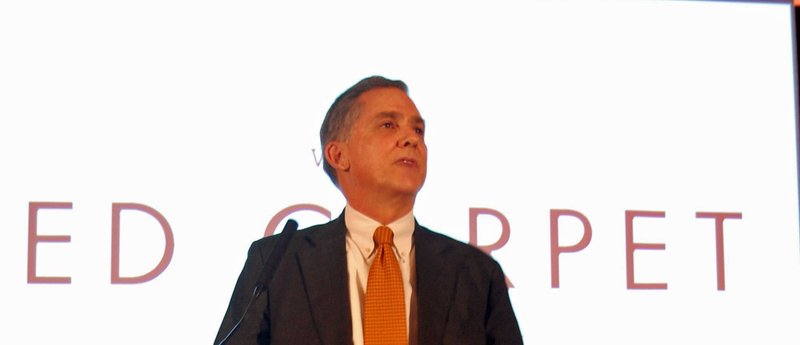CONWAY -- Connecting economic development and policy experts with entrepreneurs and paving a way to keep graduate-level H-1B non-immigrant visa workers on U.S. soil longer were the top needs expressed by a group of business, education and political leaders gathered Wednesday at the University of Central Arkansas' downtown location.
The group of about 50 was attending the Venture Ecosystem Summit put together by U.S. Rep. French Hill, R-Ark., to brainstorm legislative solutions to promote startup growth.
"This is the first time that I've tried to get all of these people together in the same room," Hill said. "I've always been intrigued by the future ecosystem. What I've seen in the last five years is an increase in supply in the ecosystem and an increase in demand. I see it working. We're creating mentorship programs and pairing expertise for anybody of any age who wants to start a business. It's not just the tech industry; it's for anybody."
Among the attendees seated in groups of about a half-dozen to each round table were University of Central Arkansas President Houston Davis; Nancy Gray, president of BioVentures of the University of Arkansas for Medical Sciences; Edward Haddock, district director for the Arkansas district office of the U.S. Small Business Administration; Charles Morgan, chief executive officer of the First Orion Corp.; John Nabholz, a member of the Arkansas Economic Development Commission; and Brett Palmer, president of Small Business Investor Alliance in Washington, D.C.
"I wanted to pull all these people together and let them share their expertise and their challenges so that we can continue to grow," Hill said. "Their input helps me to know what federal changes we need."
The attendees were split into four groups and given a list of questions asking participants to come up with legislative solutions to challenges faced in economic development.
Perhaps the most recurring issue proclaimed by the groups was the hurdle presented by the H-1B non-immigrant visa workers. The visa allows U.S. companies to hire graduate-level employees in specialized fields like engineering, science and medicine.
"We're able to get them here, but it's hell to keep them here," said Jeff Amerine, founder and managing director of Startup Junkie Consulting in Fayetteville. "The companies come to rely on them, and then they have to leave."
U.S. Citizenship and Immigration Services denied 18% of H-1B petitions for continuing employment in 2019, according to data from the National Foundation for American Policy. Between 2009 and 2017, the denial rate for existing H-1B visas did not exceed 6%.
The denial rate for first-time H-1B petitions rose from 6% in 2015 to 32% in 2019, according to the data.
According to the report from the National Foundation for American Policy, the increase in denials began in 2017 after President Donald Trump issued the "Buy American and Hire American" executive order. U.S. Citizenship and Immigration Services raised the standard of proof to obtain the H-1B petition.
Another theme expressed at the gathering was the difficulty in connecting federal government support and economic development experts with the small-business entrepreneur.
There aren't enough seats at the table for small-business owners when policy decisions are made, said Angela Mahan, owner of Rabbit Ridge Farms in Bee Branch.
Mahan pointed around the room to a couple of people.
"We need to have more events like this, but invite more small-business entrepreneurs," she said.
Amy Hopper, program officer for Delta I-fund, a startup accelerator administered by Winrock International, said policy needs to be made available in layman's terms and easier to access for the business owners.
Kim Lane -- owner of Kim Lane Co., an economic development consulting firm whose clients include Facebook Inc. and the Kauffman Foundation -- said there needs to be an easier way for "people on the ground" to connect with policymakers.
Mahan agreed.
"There's a huge disconnect," she said. "You've got to really pull us in. We don't have time. We're running our businesses. We're feeding our pigs."
John Owens, president of the North Little Rock Chamber of Commerce, told the group that every business has problems, and it's important to have sessions like the Venture Ecosystem Summit to understand and help each other.
He looked to Mahan.
"You've been able to give us more specific examples of challenges you face than anything we can get from other sources," Owens said.
In the end, the four groups all agreed on one thing: Forums like the one Wednesday need to happen more often.
Information for this article was contributed by Frank E. Lockwood of the Arkansas Democrat-Gazette.
Metro on 11/07/2019
